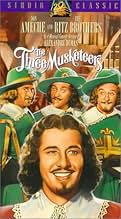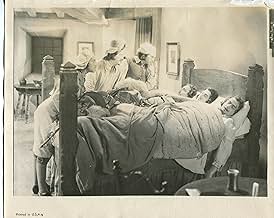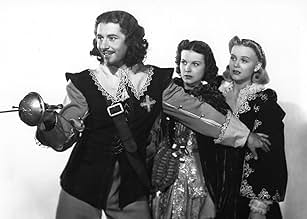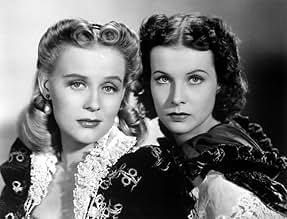CALIFICACIÓN DE IMDb
5.9/10
720
TU CALIFICACIÓN
D'Artagnan canta y se pone al frente de los cobardes hermanos Ritz, que se hacen pasar por mosqueteros.D'Artagnan canta y se pone al frente de los cobardes hermanos Ritz, que se hacen pasar por mosqueteros.D'Artagnan canta y se pone al frente de los cobardes hermanos Ritz, que se hacen pasar por mosqueteros.
- Dirección
- Guionistas
- Elenco
Douglass Dumbrille
- Athos
- (as Douglas Dumbrille)
John 'Dusty' King
- Aramis
- (as John King)
C. Montague Shaw
- Ship Captain
- (as Montague Shaw)
Opiniones destacadas
Silent film veteran Alan Dwan had helmed several of Douglas Fairbanks' best movies, and here turned out another swashbuckler, but with a difference: those zany Ritzes are on hand as a decidedly non-traditional trio of musketeers. Unlike the Marx Bros., whose movies were A-picture events, the now mostly forgotten Ritz Bros.' antics played in second features that failed to properly showcase their unique brand of knockabout comedy. Here they finally got a chance to perform in a good picture with a strong story and a good lead actor (Don Ameche as D'Artagnan) anchoring the proceedings, rather than just running about and being silly to no obvious purpose. The anarchic Ritzes here unleash their trademark catastrophic comedy to frustrate the machinations of Cardinal Richelieu and Lady deWinter. The Ritzes, of course, are not actual cavaliers, but rather a trio of dolts forced to masquerade as such to protect the Queen's honor. Much hectic action abounds, plus a few comedy songs, great silly costumes and a few of the Ritzes stage numbers such as a beautifully choreographed dance with cymbals on their bodies that must have taken years to perfect. The complex story is efficiently handled - the fat original novel plays out in a mere 72 minutes - and the straight action, heroically played by Ameche, and elaborately staged silliness of the Ritzes mixes well. An action comedy- musical would seem a difficult thing to blend correctly, but everything here is deftly handled and the cheapish production elements (leftover sets and contract players in supporting roles) do not hinder the overall effect. Worth going out of one's way to catch.
The renowned late British film historian Leslie Halliwell includes this film in his book " Halliwells hundred" as one of the funniest and under-appreciated musical spoofs in his long film going experience...this prompted me to take a look at it , and indeed it IS funny and it makes one wonder why the Ritz brothers are now all but forgotten by the general public(well, that shouldn't surprise anyone, as the "general" public has the memory of a fruit-fly when it comes to classic cinema...) and their contemporaries the 3 stooges are still so over-appreciated and all over the place....cults are strange things and often owe more to snobbish "in-the-know"-isms than real talent.... Nevertheless....the other review of this movie on this site seems to be a little besides the point....this is a bit of fluff, but it's Great fluff, made with style and often more straightforward and to the point than other more pompous versions of this old yarn...relax and enjoy it : its entertainment...as light and pleasant as a summers breeze, as funny as your self-important uncle falling face down in a cream pie! And oh yes, I DO know Friml's score for " the 3 musketeers"...it COULD have been used yes, but boy would it have been BORING!
A musical comedy version of the swashbuckling classic starring Don Ameche and the Ritz Bros? It sounds like a Catskill burlesque sketch, but turns out to be a straight, if bare-bones, version of Dumas, with mistaken identity (times 3) swapping Al, Jim & Harry in for Athos, Aramis & Porthos. Vet megger Alan Dwan was an old hand at this type of material (his THE IRON MASK/'29 -- in the restored KINO edition, please -- is one of the great Dumas adaptations) and the production has a giddying pace and a surprisingly sumptuous look to it. But the songs are unmemorable (to put it nicely) and leave an already short film with hardly enough time to fit in a measly Cliff Notes edition of the narrative.
(1939) The Three Musketeers
MUSICAL COMEDY ADVENTURE
Somewhat of a faithful adaption of Alexadre Dumas famous "Three Musketeers" except that in the film the real three musketeers are replaced by the comedy duo team of "The Ritz Brothers". Upon the real musketeers becoming drunk and being carried to their beds, the Ritz Brothers wore their costumes to pose as them so that they can try to get some of the perks at the expense of becoming a musketeer, and it was during that time they meet the fourth musketeer D' Artagnan played by Don Ameche who coincide with them to retrieve a very expensive broche. The story has somehow been adapted to "The Ritz Brothers" comedy routines, which some of the comedy scenes may have worked during the time of it's release in 1939 but very tame in today's standards. The comedy routines are identical to what one can find in "The Marx Brothers" or "The Three Stooges" except that they're well known as opposed to "The Ritz Brothers". The musical numbers was originally annoying but after "one" of the songs has been re-sung 3 times throughout the film, the impact of the song wasn't effective until the final end, and it was during that time when the song became catchy. Because it was supposed to be a comedy, I'm going to give it a respectable thumbs down.
Somewhat of a faithful adaption of Alexadre Dumas famous "Three Musketeers" except that in the film the real three musketeers are replaced by the comedy duo team of "The Ritz Brothers". Upon the real musketeers becoming drunk and being carried to their beds, the Ritz Brothers wore their costumes to pose as them so that they can try to get some of the perks at the expense of becoming a musketeer, and it was during that time they meet the fourth musketeer D' Artagnan played by Don Ameche who coincide with them to retrieve a very expensive broche. The story has somehow been adapted to "The Ritz Brothers" comedy routines, which some of the comedy scenes may have worked during the time of it's release in 1939 but very tame in today's standards. The comedy routines are identical to what one can find in "The Marx Brothers" or "The Three Stooges" except that they're well known as opposed to "The Ritz Brothers". The musical numbers was originally annoying but after "one" of the songs has been re-sung 3 times throughout the film, the impact of the song wasn't effective until the final end, and it was during that time when the song became catchy. Because it was supposed to be a comedy, I'm going to give it a respectable thumbs down.
Darryl Zanuck does to The Three Musketeers what Mr. Joyboy does to the loved ones at Whispering Glades Mortuary. They sure look well groomed and well cared for, but I wouldn't want to embrace them enthusiastically. They're just a little...well, stiff. The story goes that Zanuck in 1939 thought the time was right for a movie full of laughs, slapstick and songs, all done on the cheap but looking good. What else could have come to Zanuck's mind than Dumas' The Three Musketeers, especially since there were no rights to pay for. There's still the skeleton of the story. The Queen of France (Gloria Stuart) has given an emerald brooch to the Duke of Buckingham as a remembrance token. Cardinal Richelieu (Miles Mander) discovers this and sets up a nasty surprise for her which will ensure his power over the King. But that young man from Gascony who is eager to become a King's Musketeer, D'Artagnan (Don Ameche), learns of the plot while falling in love with one of the Queen's attendants, Lady Constance (Pauline Moore). He enlists the three Musketeers he was going to duel with and off they go to retrieve the brooch, save the Queen, foil the Cardinal's plan and frustrate the Cardinal's beautiful agent, Lady de Winter (Binnie Barnes).
However, the real three musketeers are given about three minutes of screen time. Taking their place in mistaken identity are three lackeys...the Ritz Brothers. Although Don Ameche makes a likable enough fighting and singing D'Artagnan, this Three Musketeers lives or dies on how funny you think the Ritz Brothers are. They were big stuff in the Thirties, but faded fast in the early Forties. They were loud, anarchic and could do some fine precision dancing. In this film, their stomping routine with metal plates strapped fore and aft is first rate. Since the movie only lasts about 72 minutes, there's a lot of the Ritz Brothers.
Ameche is assured, pleasant and, as he was throughout most of his career, bland. He was a popular leading man in the Thirties and Forties, but never quite found a firm grasp on top stardom. Everyone liked him, he went home at 5 p.m. to his wife and kids, didn't drink and he always knew his lines. By the time the Fifties were underway he was doing a lot of television and had a success on Broadway as the lead in Cole Porter's Silk Stockings. He was largely forgotten until, improbably, he hit stardom in the movies one more time. With Trading Places in 1983, Cocoon in 1985 and Things Change in 1988, Ameche, now as an older star character actor, was on top again. He stayed there until his death in 1993 at age 85. It's a nice story.
Ameche is both blessed and cursed in the movie. He's blessed because he has a chance to show what a skilled singer he is, from the Musketeers' march to an odd traveling song to his declaration of love for Lady Constance. He's cursed because these are some of the most mundane songs imaginable. Here's Ameche singing with his head through a hole in a wooden door to Constance:
And if my song could make you say you love me, / Then heaven would be bright above me.
With words and music straight from my heart, / My song would tell my love for you, my lady.
While he's singing this song, Pauline Moore as Constance looks as if d'Artagnan must have had too much garlic on his escargots. It's an awkwardly acted and staged scene.
But here's a toast to Lady de Winter, a spy to die for. And she'll help you. de Winter is one of the great characters in the book and she usually steals the scenes she has in the many movie versions. Lana Turner and Faye Dunaway were memorably murderous and stunningly beautiful as Milady. With Lady de Winter's fondness for causing others to die and with her cool delight in using men's lust to achieve her ends, one can only assume that she never had enough love as a child. Binnie Barnes plays her and does a great job. Barnes is blond and beautiful, and her de Winter would just as soon skewer D'Artagnan as make love to him. Binnie Barnes said once, "I'm no Sarah Bernhardt. One picture is just like another to me as long as I don't have to be a sweet woman."
How well you enjoy this movie probably depends on how well you enjoy the Ritz Brothers. The movie is dated, the humor is broad, the songs aren't very good. Still, The Three Musketeers has a lot of good natured charm.
However, the real three musketeers are given about three minutes of screen time. Taking their place in mistaken identity are three lackeys...the Ritz Brothers. Although Don Ameche makes a likable enough fighting and singing D'Artagnan, this Three Musketeers lives or dies on how funny you think the Ritz Brothers are. They were big stuff in the Thirties, but faded fast in the early Forties. They were loud, anarchic and could do some fine precision dancing. In this film, their stomping routine with metal plates strapped fore and aft is first rate. Since the movie only lasts about 72 minutes, there's a lot of the Ritz Brothers.
Ameche is assured, pleasant and, as he was throughout most of his career, bland. He was a popular leading man in the Thirties and Forties, but never quite found a firm grasp on top stardom. Everyone liked him, he went home at 5 p.m. to his wife and kids, didn't drink and he always knew his lines. By the time the Fifties were underway he was doing a lot of television and had a success on Broadway as the lead in Cole Porter's Silk Stockings. He was largely forgotten until, improbably, he hit stardom in the movies one more time. With Trading Places in 1983, Cocoon in 1985 and Things Change in 1988, Ameche, now as an older star character actor, was on top again. He stayed there until his death in 1993 at age 85. It's a nice story.
Ameche is both blessed and cursed in the movie. He's blessed because he has a chance to show what a skilled singer he is, from the Musketeers' march to an odd traveling song to his declaration of love for Lady Constance. He's cursed because these are some of the most mundane songs imaginable. Here's Ameche singing with his head through a hole in a wooden door to Constance:
And if my song could make you say you love me, / Then heaven would be bright above me.
With words and music straight from my heart, / My song would tell my love for you, my lady.
While he's singing this song, Pauline Moore as Constance looks as if d'Artagnan must have had too much garlic on his escargots. It's an awkwardly acted and staged scene.
But here's a toast to Lady de Winter, a spy to die for. And she'll help you. de Winter is one of the great characters in the book and she usually steals the scenes she has in the many movie versions. Lana Turner and Faye Dunaway were memorably murderous and stunningly beautiful as Milady. With Lady de Winter's fondness for causing others to die and with her cool delight in using men's lust to achieve her ends, one can only assume that she never had enough love as a child. Binnie Barnes plays her and does a great job. Barnes is blond and beautiful, and her de Winter would just as soon skewer D'Artagnan as make love to him. Binnie Barnes said once, "I'm no Sarah Bernhardt. One picture is just like another to me as long as I don't have to be a sweet woman."
How well you enjoy this movie probably depends on how well you enjoy the Ritz Brothers. The movie is dated, the humor is broad, the songs aren't very good. Still, The Three Musketeers has a lot of good natured charm.
¿Sabías que…?
- TriviaMentioned in Leave It to Beaver Season 6, Episode 30, The Book Report. On the show, this version of The Three Musketeers airs on television. Beaver writes his book report based off of the movie instead of reading the book.
- ErroresDuring the scene where horsemen are chasing a carriage containing Milady and D'Artagnan along a country road, an electric power substation can briefly be seen in the background.
- Citas
D'Artagnan: She's a walking post office.
- ConexionesFeatured in Big Sky: Do No Harm (2022)
- Bandas sonorasSong of the Musketeers
(1939) (uncredited)
Music by Samuel Pokrass
Lyrics by Walter Bullock
Played during the opening credits
Performed by Don Ameche and The Ritz Brothers twice
Sung by all the marhcing musketeers at the end
Selecciones populares
Inicia sesión para calificar y agrega a la lista de videos para obtener recomendaciones personalizadas
- How long is The Three Musketeers?Con tecnología de Alexa
Detalles
- Fecha de lanzamiento
- País de origen
- Idioma
- También se conoce como
- The Three Musketeers
- Locaciones de filmación
- Productora
- Ver más créditos de la compañía en IMDbPro
Taquilla
- Presupuesto
- USD 1,000,000 (estimado)
- Tiempo de ejecución
- 1h 13min(73 min)
- Color
- Relación de aspecto
- 1.37 : 1
Contribuir a esta página
Sugiere una edición o agrega el contenido que falta

























